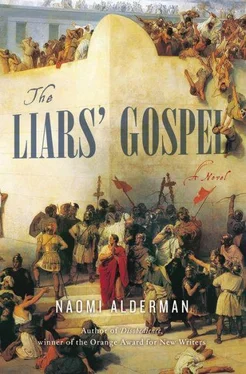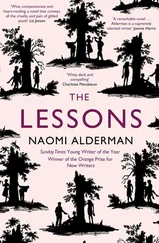He drops the incense onto the shovel. The room becomes full of the scent of the burning resins and gums and spices at once, a thick choking heady multilayered aroma. He breathes through his nose. He kneels. He prays, using the words he has learned by heart, words of the psalms of David, who found favor in the eyes of the Lord. He begs the Lord for His forgiveness for His people, he gives his service faithfully and holds the love of the Lord in his heart. This is the moment for which the whole edifice was constructed: not just the holiest place but the priests and their courtyard, the men and their sacrifices, the women and their prayers, the Temple herself. And not just the Temple, but the whole holy city of Jerusalem. And not just Jerusalem but the whole of the land of Israel. For this moment here, when he will speak to God face-to-face.
And it is true that other men have died in this place, that their fellow priests have had to pull them out by the rope that is even now tied around his own ankle. But he does not know what has killed them. He prays here until the incense smoke has filled the whole chamber. And his heart yearns to the Lord, as it does when he prays to Him every day, and his mind is full of the love of the Lord. But there is no crackling light, no sounds that are also shapes and colors, no miracle and no mystery. No force pushes him to the floor, no voice rebounds in his head. He prays, and that is all.
And when the room has filled with the thickly scented smoke, he pulls back the curtain and leaves the empty chamber. And the people rejoice, for he has returned from death to life and so they know that God has forgiven their sins. And his own experience of the moments is entirely irrelevant.
THERE IS A Roman sport. It is called “one of two will die, and the crowd will decide which.”
They love this sport. It is their most glorious entertainment. They play it with slaves and captured enemies, they roar and cheer at the spectacle of it. They set up two men — perhaps one with a sword and shield, the other with a net and trident — in a round patch of burnt sand with the smell of other men’s sweat and blood still in the air. And they say: fight. And if the men say: we will not fight, they say: then we will kill you both. If you want to have a chance to live, you must fight.
And when one man is beaten and bloodied and breathing in ragged gasps on the floor, the first man raises his sword and looks to the Governor or the Prefect or the Emperor, who listens to the shouts of the crowd. Mostly, the people like to see a death, but if the crowd shout loudly enough for some beloved gladiator, the man may be spared to fight another day.
In this way, the Governor or the Prefect or the Emperor seems to have the gift of life in his hands. In this way, he appears to be rescuing one man from death. Rather than the truth. Which is that he has condemned both men to die someday, in some place if not in this, for no better reason than that the sport and the sight of it please him and the crowd. It is a good trick, to kill a man while still appearing to be the one who saves a life.
When the time comes for Bar-Avo to look into the face of the Prefect, he knows that he sees a man who, like him, has killed so many men that he can no longer remember their names or count the number or think of how each death felt as it escaped between his fingertips. Men like these recognize each other, and Bar-Avo sees the same sense in Pilate of looking back and thinking: so many and still not done yet? So many dead and still the business is not finished?
But Bar-Avo rarely looks back, if truth be told. For a man like Bar-Avo, everything is a constant present. Like a fight, where each blow must be landed or dodged now, and now, and now. The life that he lives is like that. He is always looking into the face of the Prefect, and he is always listening to the crowd calling out, “Barabbas! Barabbas!” and he is always, always feeling the knife in his hand and advancing on the old man and attempting — he knows not exactly why — to comfort his shuddering as he brings the blade towards his throat and bleeds him in less time than it takes to draw one in-breath.
There is Giora to his left, and Ya’ir to his right, and they are roaring at the soldiers. Ya’ir is shorter, stocky, already sprouting hair across his chest although they are only fifteen. Giora is tall, athletic, nimble. He, in the center, is neither particularly strong nor particularly fast, but he is brave and clever.
“Come on!” he shouts to the soldiers, and it’s easy because he knows Giora and Ya’ir will back him up. “Come and get us if you’re not too fucking scared!”
It was like those dare games they’d played as children. Dare you to climb that tree. Dare you to walk into the dark cave alone. Dare you to dive from that rock.
“Did you leave your balls back home, Samaritan scum?”
That one’s his too. It makes Ya’ir and Giora crease up laughing.
He starts a chant: “No balls! No balls! No balls!”
“I dare you to throw a pebble at those soldiers’ shields. Just a pebble. I dare you,” he says to Ya’ir.
A boy, dared to do something, can he refuse? Would he even want to refuse? When the pebble is so shiny and smooth in his hand, and the sea of shields is so gleamingly tempting. Ya’ir stares at the pebble, feeling it with his fingertips. For a moment they think he won’t do it. Then he throws it. It bounces off the metal and pings on the ground. And nothing happens. Behind their helmets the soldiers are impassive.
A few other boys are watching them now. Standing behind them on the street. Maybe backing them up, maybe ready to run if something kicks off.
“Come on,” says one of them, “something bigger. Come on.”
Come on. That pottery jar, the small one. Giora, greatly daring, spins around, noticing the dark-eyed girls watching them from a rooftop. He hurls the jar, it shatters and still the soldiers do nothing. The boys are getting bigger by the moment now, strutting and squaring their shoulders. They smell of boy sweat and bottled-up anger. They’re remembering how the soldiers treat them, how they get pushed to the back of the line in the market, how the soldiers laugh at them, how they accuse them of thieving when they were just looking, how they search them for weapons in the street like criminals. All of them are suspect just because of who they are. They’re remembering how one of these soldiers took out that girl they like. Because isn’t this always how it is, over and over again?
Come on. It’s his turn now, Bar-Avo’s. He hefts half a brick, feeling the weight of it, then hurls it in a wide arc. It bangs against a shield. It leaves a dent, and the boys laugh and shout, “Look what you’ve done!” just like their mums would. They surge forward towards the soldiers but then lose their nerve before they reach the line of bronze men. They jeer at each other, fall back.
Someone throws a cobblestone. It gets a man on his head, he falls down. He’s all right, he’s moving, but the boys are shocked for a moment. Bar-Avo can see him holding his head, moaning. It’s a nasty sight but at the same time exciting. Something’s going to happen, his whole body knows it. The soldiers start shouting: angry barked commands. The boys don’t understand, the soldiers’ accents are thick, the words they’re using aren’t Aramaic or Hebrew.
Bar-Avo feels himself becoming strong, the blood coming to all the right places as if his heart knew that this is what a man is made for. Now he’ll be a man, right here, father or no. The soldiers start to advance, orderly in their phalanx, and now it’s on. Giora runs towards the soldiers, roaring and throwing cobblestones with both hands, and he gets another one, knocks him down, and then the line breaks, because one of the other men decides to chase, even though his commander shouts at him to come back, to hold the line, not to be an idiot.
Читать дальше












